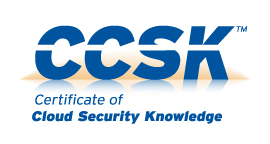CCSK-DESC
Cloud Computing Security Knowledge
הסמכת CCSK (Cloud Computing Security Knowledge) הינה הסמכה מבית ארגון ה – Cloud Security alliance. הסמכה זו הינה ההסמכה המובילה בעולם המכשירה מקצוענים ממגוון מקצועות ה – IT להבנת מחשוב ענן וכיצד יש להגן עליו. הקורס סוקר את מגוון תחומי אבטחת המידע הקיימים וממפה את השינויים הנדרשים כדי ליישמם בסביבות ענן על מגוון המודלים השונים.
ה – Cloud Security Alliance הינו ארגון ללא מטרות רווח שהוקם במטרה לחזק את הידע והמחקר בנושא אבטחת מידע לסביבות ענן ע”י:
- פרסום ספר ההדרכה לאבטחת מידע בענן – המסמך המקיף ביותר שקיים כיום בשוק.
- מחקר ופיתוח של כלים להערכה של ספקי ענן בהיבטי של אבטחת מידע.
- מציעה הסמכה בינלאומית לנושא מחשוב ענן (CCSK). וקורס הכנה להסמכה זו (הבחינה כלולה בעלות הקורס).
מבנה הקורס:
קורס CCSK מורכב מהחלקים הבאים:
- קורס בסיסי (CCSK Foundation) – יומיים פרונטליים (סילבוס מלא בהמשך). עלות: 3,400 ₪
- קורס מתקדם (CCSK Plus) – יום נוסף ובו מתבצעות מעבדות Hands on על גבי סביבת Amazon AWS. במעבדות מתורגלים הנושאים אשר נלמדו יום קודם – עלות 5,650 ₪ (עלות זו כוללת את העלות של הקורס הבסיסי)
עלות הקורס כוללת:
- כיתת הדרכה, שתיה, כיבוד וארוחת צהרים
- ערכת קורס כולל ספר קורס וספר מעבדות
- הדרכה ע”י מדריך רישמי
- שני שוברים לבחינת ה – CCSK
- תעודת סיום קורס
Class detailed syllabus:
CCSK Foundation
Module 1: Introduction to Cloud Computing. This module covers the fundamentals of cloud computing, including definitions, architectures, and the role of virtualization. Key topics include cloud computing service models, delivery models, and fundamental characteristics. It also introduces a model for assessing the risk of moving to the cloud and the shared responsibility model.
Module 2: Infrastructure Security for Cloud Computing. This module digs into the details of securing the core infrastructure for cloud computing- including cloud components, networks, management interfaces, and administrator credentials. Students will learn the key components to public and private clouds and techniques for securing them.
Module 3: Managing Cloud Security and Risk. This module covers important considerations for managing security for cloud computing. It begins with risk assessment and governance, then covers legal and compliance issues, such as discovery requirements in the cloud. It finishes with a discussion or portability and interoperability and managing incident response when working with cloud providers.
Module 4: Data Security for Cloud Computing. One of the biggest issues in cloud security is protecting data. This module covers information lifecycle management for the cloud and how to apply security controls, with an emphasis on public cloud. Topics include the Data Security Lifecycle, cloud storage models, data security issues with different delivery models, and managing encryption in and for the cloud.
Module 5: Application Security and Identity Management for Cloud Computing. This module covers identity management and application security for cloud deployments. Topics include federated identity and different IAM applications, secure development, and managing application security in and for the cloud.
Module 6: Selecting Cloud Services. This module covers key considerations when evaluating, selecting, and managing cloud computing providers. It includes important questions to ask and what to look for. We also discuss the role of Security as Service providers.
Hands on lab syllabus (CCSK Plus):
Exercise 1: Protect root account access. Enable MFA and other security option. Students will create a IAM users and practice with groups / roles and policies. Topics include creating an AWS policy, applying to various roles and users and automating monitoring options.
Exercise 2: Create and Secure a Public Cloud VPC & Instance. Students will create a VPC with security groups & subnets, learn on various cloud instance on a public cloud infrastructure and establish a security baseline. Topics include creating an AWS instance, configure cloud trail, cloud watch and AWS inspector
Exercise 3: Encrypt Public Cloud Data. In this module students will dive into cloud storage options and learn the basics to encrypt data for their public cloud deployment.
Exercise 4: Create and Secure a Cloud Application: Now the students will secure their first public application for the cloud, following best practices such as architecting their cloud application stack and managing appropriate network security.
Exercise 5: Identity Management for the Cloud. Students will create a basic federated identity infrastructure to support their cloud application and learn additional details on standards like SAML and OAuth.
